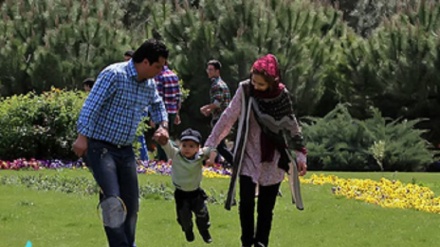Iranian Family (8)
Welcome to this week's episode of the series Iranian Family. Many youths imagine that married life and the post-marriage conditions are similar to the circumstances which exist during the engagement of the two individuals.
The comparison of these two set of conditions has led some couples to become pessimistic about married life. The world of friendship and engagement is a world of ideals and dreams, with the existing relations being highly emotional and impeccable. This is while married life is an actual and tangible life. In this world, only by making utmost efforts and maintaining patience, one can build an ideal life.
In married life, other topics are prioritized, and men, based on the structure of their brain, and the duty that they have shouldered throughout the history of creation, prioritize their work and social achievements. Meanwhile, women, whose most ideal moment of their life was when their significant other highly prioritized them, start to imagine that the love of their spouse toward them has faded away.
Hence, in order to embark on married life, one has to be realistic. You should narrow the gap between realities and ideals in your mind in a bid to make decisions logically and realistically. You should make use of your prudence and wisdom and you should make each other understand that the apparent weakening of emotional relationships is not a sign and manifestation of lack of kindness and love.
Now, let's get familiar with another feature of Iranian families. One of the main characteristic traits of Iranian families due to the important role played by parents in their children's upbringing is the culture of children's respect for their parents. Within the Iranian community, we maintain the concept of children's respect for their parents. one of the leading Iranian sociologists, Dr. Armaki, in his efforts to manifest the importance and significance of respect for parents, and terms of expression of love and respect for one's parents, has carried out an opinion poll and has studied two options. Based on the first option, irrespective of the traits and shortcomings of parents, they should be respected and loved. Meanwhile, the second option is that children are not duty-bound to respect and love their parents.
This renowned Iranian sociologist adds that we studied respect of children for their parents in two phases in time, which led to a meaningful difference in respect for parents. the overwhelming majority of respondents opted for the necessity to honor and respect parents, irrespective of their characteristic traits and potential shortcomings.
Meanwhile, respect and honor for parents is partly based on religious teachings and beliefs. Several ayahs of Holy Quran point out that respect and gratitude for parents is synonymous to expression of gratitude toward God Almighty.
The relationships between parents and their children is a pivotal and sensitive relationship. The solid emotional bond which exists parents and children is usually much stronger than relationships among siblings.
Meanwhile, children learn patience and sympathy from their parents; gradually becoming prepared for embarking upon the community.
The fact of the matter is that the strong emotional bond between parents and children has still made it impossible for the tools of the modern world and individualism to fade away or wipe out children's respect for their parents.
One of the duties of spouses in their married life is to consult with each other in making decisions. Currently, it is said that decision-making marks the heart of management. An appropriate and logical decision is made when all of the members of the related group are consulted. Spouses should consult with each other on a whole host of topics of importance such as selection of homes and vehicles, holiday making, familial visits, invitation of guests, communication or lack of communication with particular individuals, familial expenditures, and purchase of household appliances.
Upon consultation, you can benefit from the view, capabilities, and experiences of your spouse in a particular realm and domain, which enables you to make a better decision. Furthermore, when you make a decision after consultation with, and agreement of your spouse, you would not blame yourself, and your spouse would also not blame you if your decision turns out to be wrong. However, if you would want to make your life decisions on your own and without any consultation, you would shoulder a major responsibility, which would be exhausting.
Consultation with your spouse leads to the elevation and further development and growth of your married life.
RM/SS


